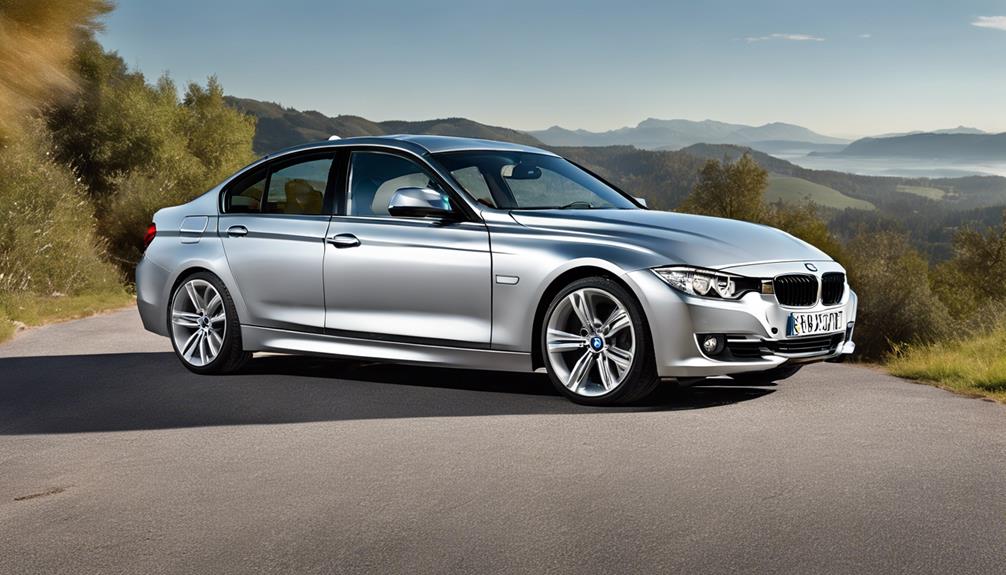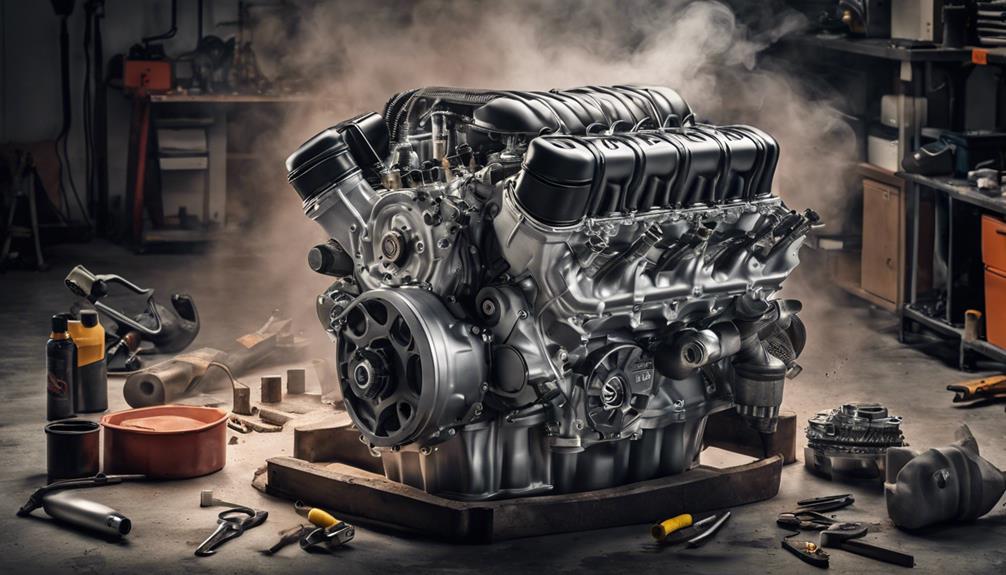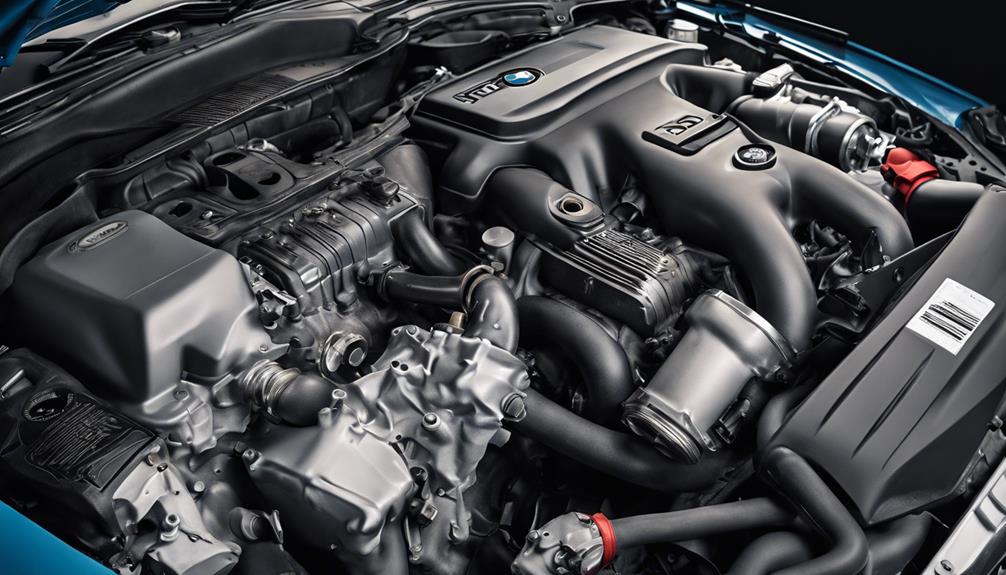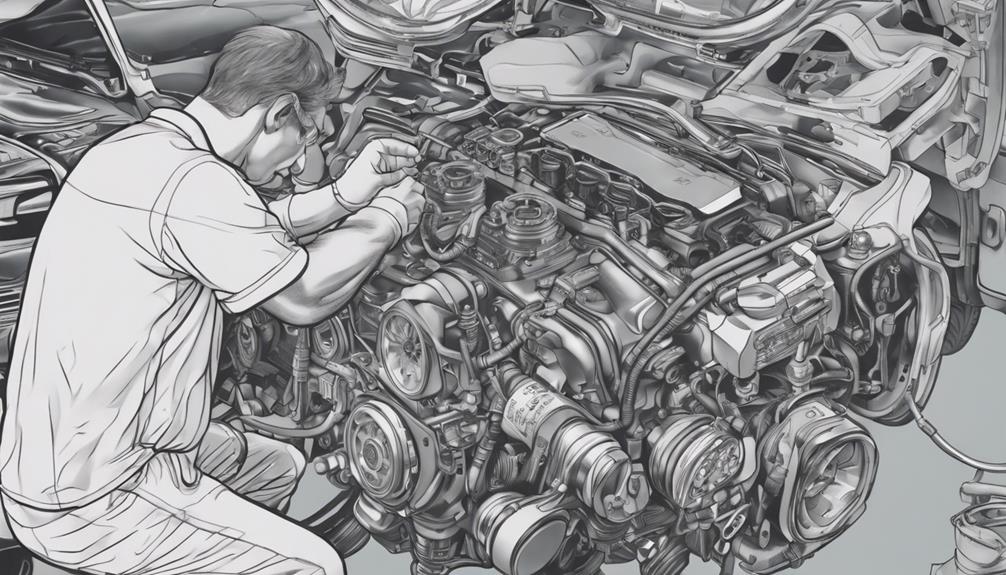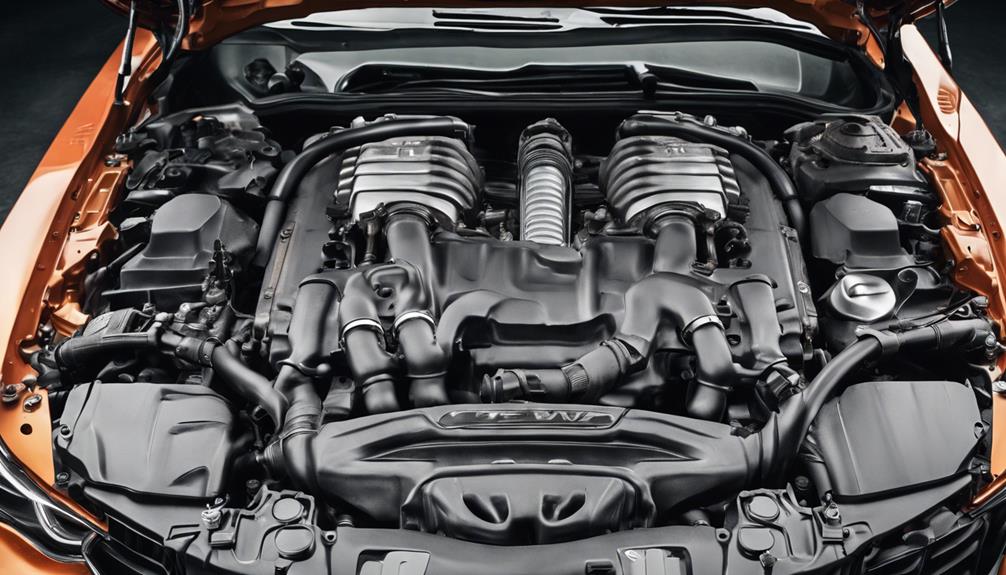Considering the reliability of the BMW 335i, you should note factors like average repair cost, common issues, and problematic years such as 2007, 2008, 2009, 2011, and 2013. Understanding these aspects is essential for informed decision-making and long-term satisfaction with ownership of the BMW 335i. Further details provide deeper insights into maintenance, issues to watch for, and comparisons with other models.
Key Takeaways
- RepairPal rates BMW 335i at 2.0 for reliability.
- Common issues include engine rattle and faulty fuel pumps.
- Most problematic years are 2007, 2008, 2009, 2011, and 2013.
- Regular maintenance is crucial for longevity and performance.
- Higher repair costs and shop visits compared to other luxury midsize cars.
Overview of BMW 335i Reliability
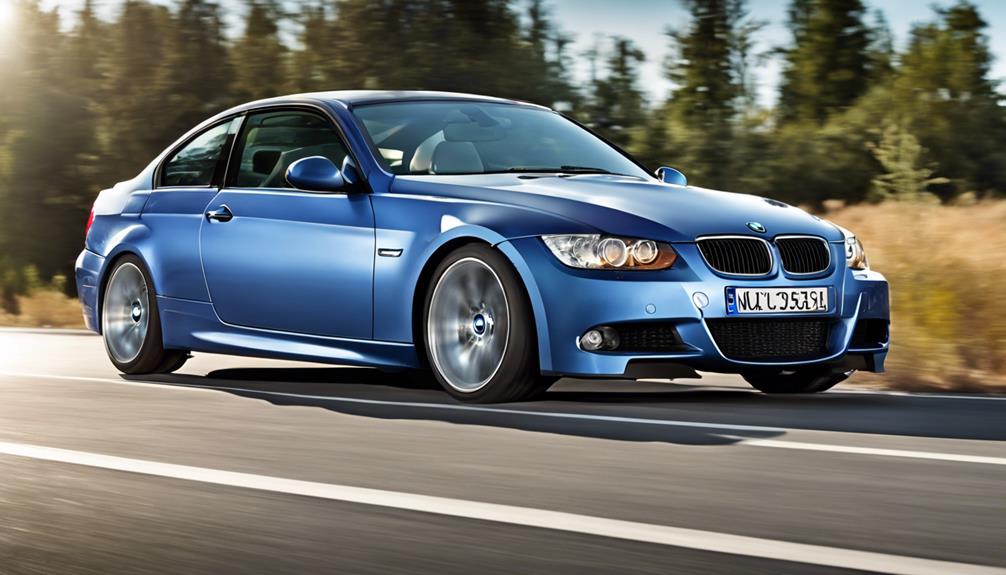
Analyzing the trustworthiness ratings from RepairPal and J.D. Power provides a thorough understanding of the BMW 335i's performance in the automotive market. RepairPal rates the BMW 335i at 2.0 out of 5.0 for reliability, indicating potential issues that owners may face. On the other hand, J.D. Power gave the 2015 model a solid 81/100 rating for reliability, showcasing a more positive outlook on this particular year. Despite this, the BMW 335i still ranks 28th out of 31 for luxury midsize cars regarding reliability, hinting at some consistency issues across different models and years.
It is essential to note that proper maintenance can have a significant impact on the BMW 335i's reliability and lead to a long service life. The 2015 BMW 3 Series Sedan 4D 335i, in particular, performed well within its category for reliability, highlighting the importance of attentive care and timely servicing to ensure a dependable driving experience. Understanding these trustworthiness ratings can guide you in making informed decisions when considering a BMW 335i for your next vehicle purchase.
Common Issues With BMW 335i
When considering a BMW 335i, it's important to be aware of common issues that owners may encounter, such as engine rattle problems in the 2008 model year. Here are some key points to keep in mind:
- Engine Rattle Issues: The 2008 BMW 335i is known to experience engine rattle problems, which can be concerning for owners due to potential underlying issues that may necessitate attention.
- Serpentine Belts: Broken serpentine belts in the BMW 335i can lead to engine breakdowns and loss of power steering, impacting the overall performance and safety of the vehicle.
- High-Pressure Fuel Pumps: Faulty high-pressure fuel pumps are a common problem in the 2007 BMW 335i. This issue can cause power loss and activate the check engine light, indicating the need for immediate inspection and potential replacement to avoid further complications.
Being informed about these common issues can help BMW 335i owners address potential concerns promptly and safeguard the longevity and reliability of their vehicles.
Top Problematic Years for BMW 335i
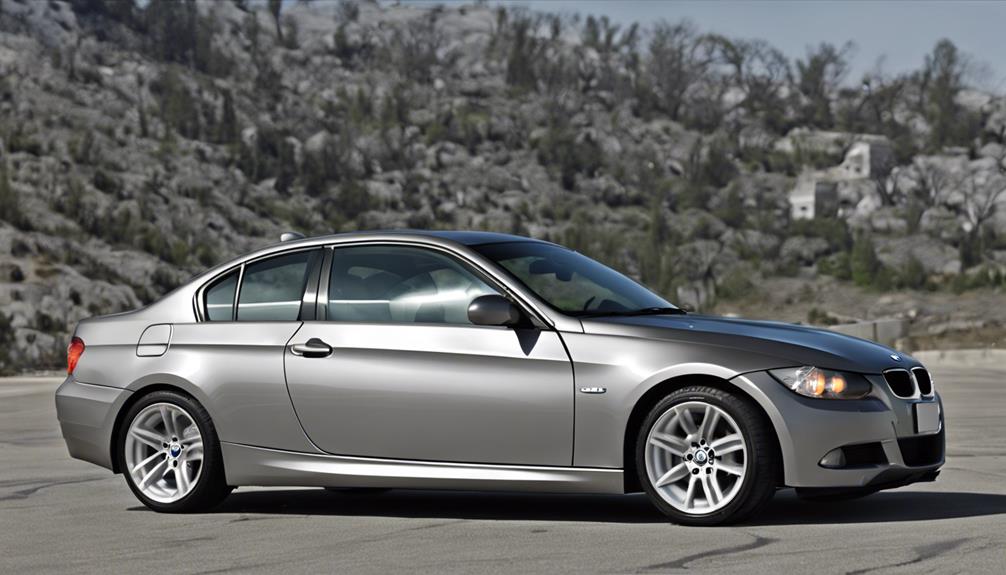
For BMW 335i owners, understanding the most problematic years can provide valuable insight into potential issues and necessary maintenance. The top problematic years for BMW 335i include 2007, 2008, 2009, 2011, and 2013. These years are associated with common problems such as turbo failure and engine overheating.
The 2007 model, in particular, is known for being the least reliable, with numerous consumer complaints and significant reliability issues. Owners of BMW 335i from these years may face more breakdowns, necessitating additional maintenance and repairs.
Avoiding these problematic years can help you steer clear of potential costly repairs and ensure a more reliable driving experience. Keep an eye out for signs of turbo failure and engine overheating if you own a BMW 335i from these years, as being proactive can save you time and money in the long run.
Reliability Ratings for BMW 335i
The reliability ratings for the BMW 335i reflect RepairPal's assessment of 2.0 out of 5.0, positioning it as the 28th among luxury midsize cars regarding reliability. When considering the BMW 335i's reliability, it's crucial to note the following:
- Repair Costs: The average annual repair cost for the BMW 335i amounts to $1,030, with owners typically bringing their vehicles in for repairs 1.2 times per year. These costs can add up, impacting the overall ownership experience.
- Probability of Severe Repairs: The BMW 335i has an 18% probability of experiencing severe repairs. This statistic suggests a higher likelihood of facing more frequent and potentially costly repairs compared to other vehicles.
- J.D. Power Rating: Despite its mixed reliability record, the 2015 BMW 335i received a respectable rating of 81/100 from J.D. Power, indicating a generally positive performance within its category.
Being aware of these reliability ratings and potential issues can help you make informed decisions when considering a BMW 335i.
Factors Affecting BMW 335i Reliability
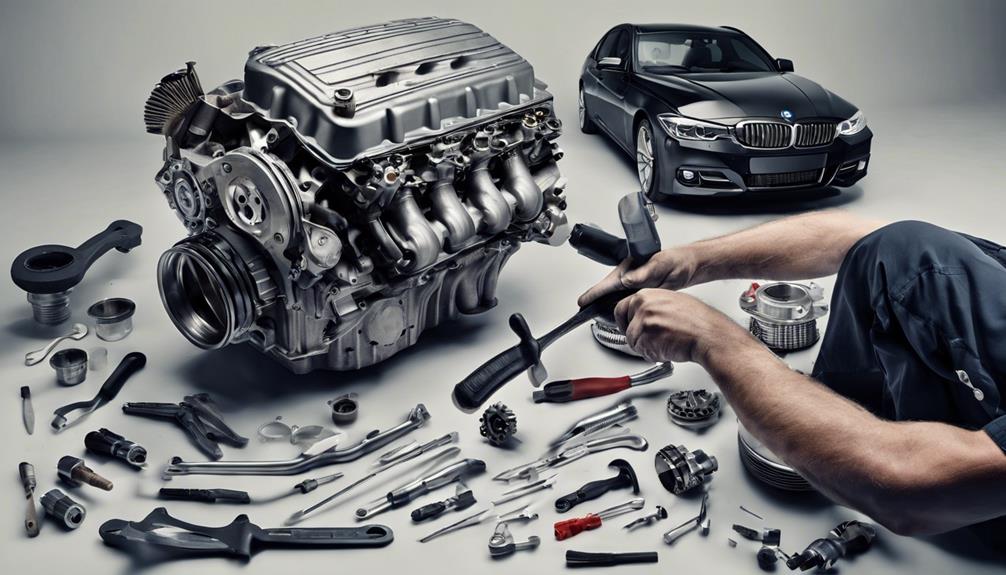
When considering factors influencing the reliability of your BMW 335i, common issues and maintenance tips play an important role. Being aware of common problems like high-pressure fuel pump failures and electronic issues can help you address potential issues preemptively.
Additionally, adhering to a regular maintenance schedule, including oil changes, fluid checks, and timely repairs, can greatly impact the longevity and dependability of your BMW 335i.
Common Issues
Amidst the driving experiences of BMW 335i owners, several common issues significantly impact the car's reliability, causing concerns such as broken serpentine belts, high-pressure fuel pump problems, and engine rattling.
- Broken Serpentine Belts
- High-Pressure Fuel Pump Problems
- Engine Rattling
These issues can lead to engine breakdowns, power loss, and activation of the check engine light, affecting the overall performance of the vehicle. The 2007, 2008, 2009, 2011, and 2013 model years are particularly known for these reliability issues.
Timely repairs and proper maintenance are vital in addressing these common problems with the BMW 335i, ensuring a smoother driving experience and longevity for your vehicle.
Maintenance Tips
Routine maintenance plays a critical role in enhancing the reliability of your BMW 335i. Keeping up with regular oil changes, addressing warning lights promptly, and maintaining the cooling system are key factors in guaranteeing your vehicle's longevity. By following the manufacturer's recommended service schedule, you can prevent potential issues and uphold the car's reliability over time. Additionally, checking tire pressure, alignment, and suspension components contributes to the overall reliability of your BMW 335i. Being proactive with maintenance not only helps avoid costly repairs but also gives you peace of mind knowing your vehicle is in top condition.
| Maintenance Tips | Importance |
|---|---|
| Oil Changes | Secures engine health |
| Warning Lights | Prevents major issues |
| Cooling System | Prevents overheating |
| Service Schedule | Long-term reliability |
| Tire Pressure & Alignment | Overall vehicle health |
Repair Costs for BMW 335i
Repair costs for the BMW 335i, with an average annual expense of $1,030, reflect the impact of its premium brand status on reliability ratings. The higher costs associated with repairing a BMW 335i are influenced by the luxury and performance engineering that define the brand.
Here are some key points to keep in mind regarding repair costs for the BMW 335i:
- Average Annual Repair Cost: The BMW 335i comes with an average annual repair cost of $1,030, which is above the industry average. This higher cost is due to the premium parts and specialized labor required for BMW vehicles.
- Probability of Severe Repairs: Owners of the BMW 335i face an 18% probability of encountering severe repair issues. These repairs often involve critical components such as the engine or transmission, contributing to the overall repair expenses.
- Frequency of Repairs: On average, BMW 335i owners bring their vehicles in for repairs 1.2 times per year. This frequency underscores the importance of regular maintenance to prevent major issues and reduce repair costs in the long run.
Frequency of BMW 335i Repairs
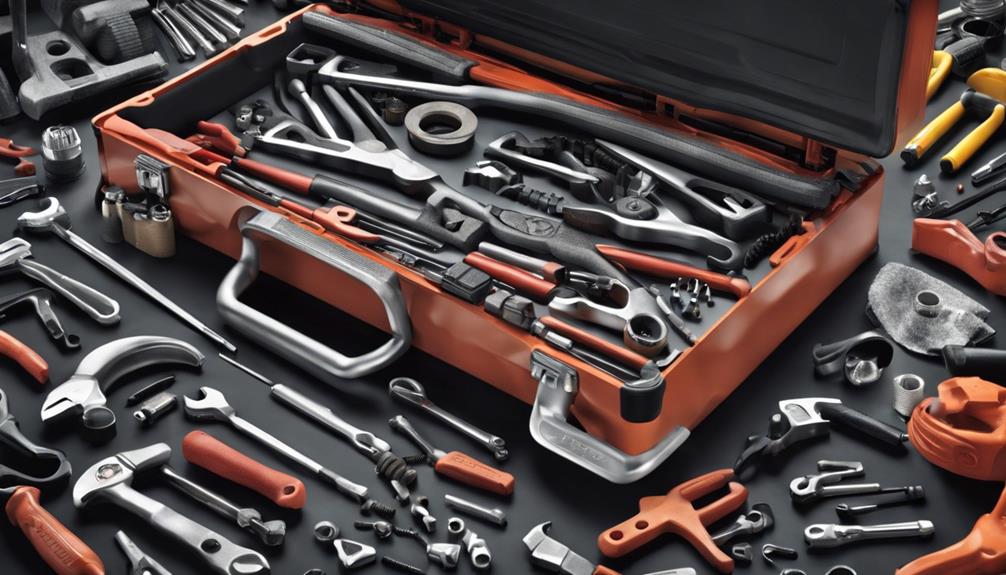
Considering the intricate engineering of the BMW 335i, the frequency of repairs stands at an average of 1.2 shop visits per year. This means that owners typically need to bring their BMW 335i in for repairs just over once a year. While this frequency is relatively low compared to some other models, it's vital to highlight that these visits can still add up in regards to time and inconvenience. The 1.2 shop visits per year reflect the need for regular maintenance and occasional repairs to keep the BMW 335i running smoothly.
It's essential to stay on top of routine maintenance to potentially avoid more severe issues down the line. By addressing any necessary repairs promptly, you may help prevent minor problems from escalating into larger, more costly ones. Understanding the typical frequency of repairs for the BMW 335i can assist owners in planning for regular maintenance and budgeting for potential fixes.
Severity of BMW 335i Issues
With a reliability rating of 2.0 out of 5.0, the BMW 335i ranks 28th out of 31 luxury midsize cars for the severity of its repair issues. Understanding the severity of BMW 335i issues is vital for making informed decisions as a car owner. Here are some key points to take into account:
- Repair Frequency: Owners of BMW 335i vehicles bring their cars in for repairs an average of 1.2 times per year. This indicates a moderate need for maintenance and attention to potential issues.
- Probability of Severe Repairs: The likelihood of experiencing severe repairs on a BMW 335i is 18%. While not extremely high, it underscores the importance of regular maintenance to prevent major issues.
- Average Repair Cost: The average annual repair cost for a BMW 335i is $1,030. This figure provides an estimate of the financial commitment required to keep the vehicle in good condition.
Longevity of BMW 335i Models
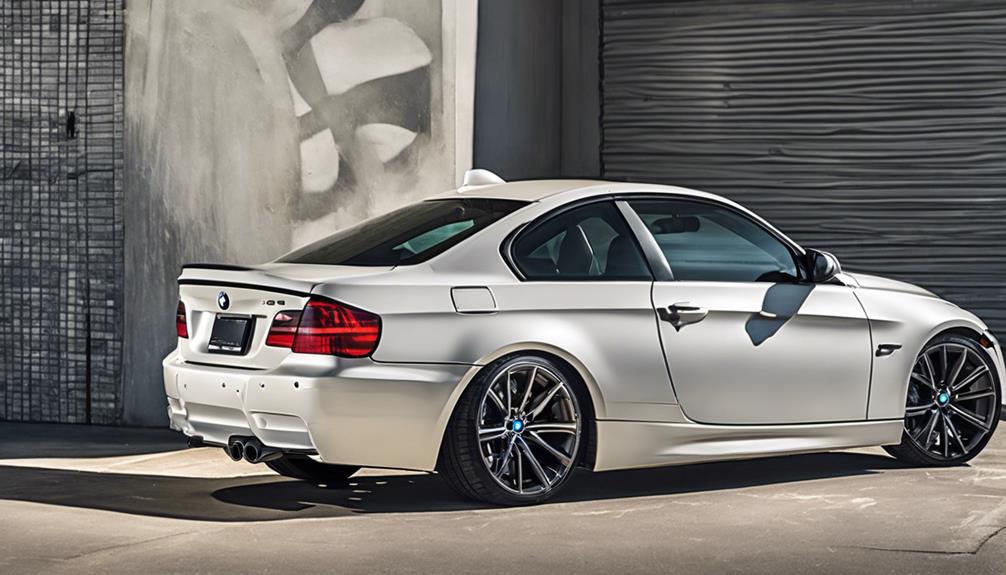
Among the BMW 335i models, specific years like 2010, 2012, 2015, and 2016 stand out for their exceptional longevity and reliability. These models have garnered a reputation for their durability and minimal issues compared to earlier versions. Owners of these BMW 335i models report fewer breakdowns and overall satisfaction with their vehicles' performance. Here's a breakdown of the longevity and reliability of the mentioned BMW 335i models:
| BMW 335i Model | Reliability | Longevity |
|---|---|---|
| 2010 | High | Long |
| 2012 | High | Long |
| 2015 | High | Long |
| 2016 | High | Long |
These specific years have proven to be the most reliable within the BMW 335i lineup, offering longevity and peace of mind to owners. If you aim for a BMW 335i model with a track record of lasting performance, considering these years might be a wise choice.
Maintenance Tips for BMW 335i Owners
To maintain the reliability and longevity of your BMW 335i, implementing proper maintenance practices is crucial. Here are some essential maintenance tips for BMW 335i owners:
- Regular Oil Changes: Make sure you schedule oil changes every 5,000 to 7,500 miles to keep your engine running smoothly and prevent premature wear and tear.
- Air Filter Replacement: Check and replace the air filters every 20,000 to 30,000 miles to optimize engine performance and fuel efficiency.
- Cooling System Inspection: Regularly inspect the cooling system components, such as the radiator, hoses, and thermostat, every 60,000 miles to prevent overheating issues and maintain proper engine temperature.
Following these maintenance tips diligently won't only help in enhancing the performance of your BMW 335i but also contribute significantly to its overall reliability and longevity. Remember, staying proactive with maintenance can save you from costly repairs down the road.
Comparing BMW 335i to Other Models

When compared to other luxury midsize cars like the Acura TL and Lexus ES350, the BMW 335i may exhibit differences in performance and reliability.
Understanding how the BMW 335i stacks up against these models can provide valuable insights into its overall ownership experience.
Consider factors like repair frequency, cost, and average annual repair expenses to make an informed comparison.
Performance Comparison
In performance comparisons with other luxury midsize cars, the BMW 335i demonstrates a higher likelihood of requiring major repairs and incurring elevated maintenance costs. When pitted against models like the BMW 328i and Mercedes-Benz C300, the BMW 335i falls short regarding reliability and repair expenses. Here's how it stacks up:
- Repair Costs: Owners of the BMW 335i often face higher repair bills in comparison to similar luxury midsize cars.
- Frequency of Shop Visits: The BMW 335i tends to spend more time in the shop for repairs than its counterparts.
- Severity of Repairs: The likelihood of major repair issues is significantly higher with the BMW 335i, impacting overall performance and ownership satisfaction.
Reliability Ranking
The reliability rankings of the BMW 335i, when compared to other models within its category, reveal a concerning trend of lower performance regarding maintenance and repair issues. Among luxury midsize cars, the BMW 335i ranks 28th out of 31 for reliability, with RepairPal rating it 2.0 out of 5.0. J.D. Power's reliability rating for the 2015 BMW 335i model is 81/100. Owners of the BMW 335i face an average annual repair cost of $1,030, making approximately 1.2 trips for repairs per year. The probability of experiencing severe repairs with the BMW 335i stands at 18%. Below is a comparison table showcasing the BMW 335i against other luxury midsize cars regarding reliability:
| Model | Reliability Ranking |
|---|---|
| BMW 335i | 28th out of 31 |
| Lexus ES | 1st out of 31 |
| Audi A4 | 12th out of 31 |
Final Verdict on BMW 335i Reliability
Revealing the ultimate evaluation of BMW 335i reliability uncovers a mixed bag of performance metrics and owner experiences. Despite some positive ratings, common problems persist, affecting overall satisfaction with the vehicle. Here's what you need to know:
- RepairPal Rating: The BMW 335i's RepairPal reliability rating of 2.0 out of 5.0 positions it at 28th out of 31 for luxury midsize cars, indicating potential issues that owners may encounter.
- J.D. Power Score: The 2015 BMW 335i model received a respectable 81/100 rating from J.D. Power, suggesting relatively high reliability compared to other vehicles in its class.
- Common Issues: Owners have reported various common problems such as engine rattle, broken serpentine belts, and faulty high-pressure fuel pumps. These issues can impact the driving experience and may require costly repairs.
Understanding these aspects of BMW 335i reliability can help you make an informed decision when considering this model.
Frequently Asked Questions
How Reliable Is a BMW 335i?
When evaluating a BMW 335i's reliability, it's crucial to consider different ratings. RepairPal gives it a 2.0 out of 5.0, while J.D. Power rates it at 81/100 for 2015 models. With proper maintenance, you can prolong its lifespan.
Does BMW 335i Last Long?
Yes, a BMW 335i can last long with proper care. Regular maintenance, timely repairs, and driving responsibly can extend its service life. Following the manufacturer's guidelines and addressing issues promptly can help guarantee durability.
What Year Is the Most Reliable 335i?
For the most reliable BMW 335i, consider the 2010, 2012, 2015, and 2016 models. These years show lower complaint rates and address common issues like fuel pump and wastegate problems, offering better performance and reliability.
Can I Daily Drive a 335i?
You can daily drive a BMW 335i, but expect potential maintenance costs. Stay proactive with regular maintenance based on age and mileage to enjoy the 335i's performance. Address common reliability issues for daily driving peace of mind.
Conclusion
Overall, when considering the reliability of the BMW 335i, it's important to be aware of the common issues, problematic years, and factors that can impact its performance.
By staying on top of maintenance and being proactive in addressing any potential issues, BMW 335i owners can enjoy a reliable driving experience.
While the BMW 335i may have its drawbacks, with proper care and attention, it can still be a dependable and enjoyable vehicle to own.





